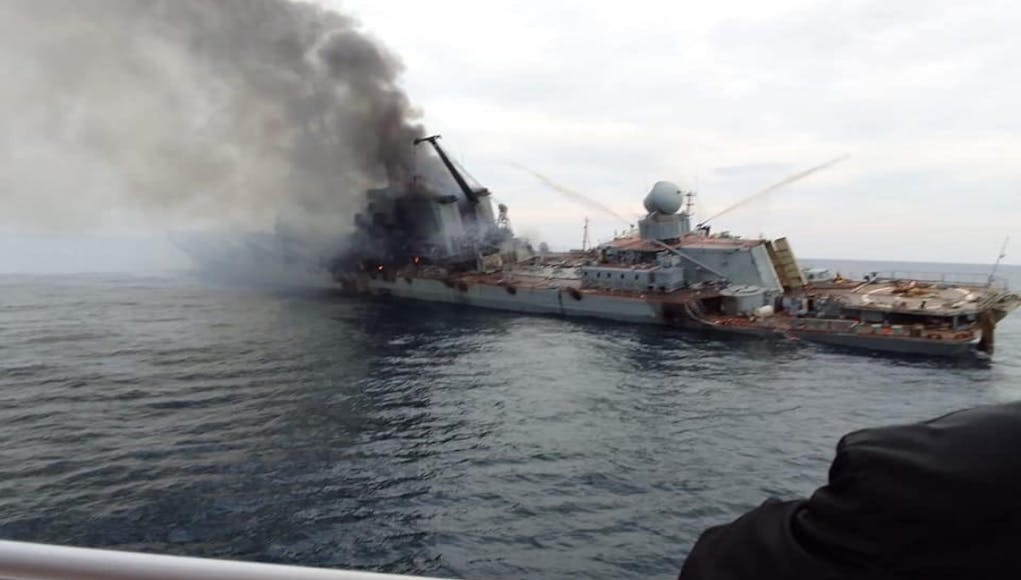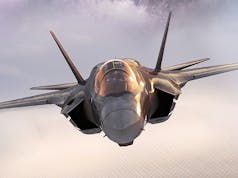When it comes to Russia’s so-called “red lines,” the Kremlin appears to have mastered the art of ambiguity.
These lines—boldly declared by President Vladimir Putin—are meant to be strict boundaries that foreign powers dare not cross, or so we’re led to believe.
However, in reality, they seem to shift more frequently than a London fog, and with just as little clarity.
This article is the opinion of the author and not necessarily that of the UK Defence Journal. If you would like to submit your own article on this topic or any other, please see our submission guidelines.
Let’s rewind to April 2021, when Putin first issued one of his many warnings, outlining where the West must not tread. The rhetoric was simple: Russia would not tolerate NATO’s interference in Ukraine, and any such involvement would cross a red line, sparking dire consequences.
Then came February 2022, and despite NATO’s growing support for Ukraine, Russia still drew another line, launching what it euphemistically called a “Special Military Operation” to safeguard its national interests. According to Putin, the West had gone too far by backing Kyiv, and this was Moscow’s ultimate response.
But here’s the thing: Putin’s lines in the sand haven’t held. Instead of triggering an apocalyptic showdown, the West kept pushing, rightly. Weapons flowed into Ukraine, intelligence was shared, and military aid poured in from NATO member states.
Each step was said to cross one of Russia’s “red lines,” and yet the Kremlin’s threats of retaliation never materialised. It’s as though each warning from Moscow is a bluff, designed to slow down Western support while the world debates whether to call Russia’s hand.
Take the case of long-range missiles. In 2022, Putin warned that providing Ukraine with these could be the last straw, something Moscow could never tolerate. And yet, in 2023, Ukraine started using British-supplied Storm Shadow missiles—without any spectacular Russian retaliation. The missiles, with a range of over 150 miles, have already struck targets in Russian-held Crimea, but Russia’s much-touted “red line” remains mysteriously intact.
Then there was the infamous warning about Western tanks. Putin and his officials declared that sending modern battle tanks to Ukraine would cross an unthinkable threshold. In January 2023, when countries like the UK sent Challenger 2 tanks, along with American Abrams and German Leopard tanks, we were told it could escalate into something far worse. Yet, no such escalation followed. The red line faded, just like so many others.
Perhaps the most revealing example is Russia’s response to Western fighter jets. For years, Moscow warned that delivering advanced fighter aircraft like the F-16s would force Russia’s hand, potentially even leading to nuclear consequences. By 2024, F-16s were on their way to Ukraine, with NATO powers increasingly comfortable providing more military hardware. Putin’s threats once again proved hollow—another red line casually brushed aside by the West.
The concept of red lines should, theoretically, be unbreakable barriers. Instead, Moscow has developed a talent for moving the goalposts. When Ukraine made its first foray into Russian territory in Kursk in August 2024, an undeniable violation of yet another so-called boundary, the world held its breath. But rather than unleashing the wrath of Russia’s military machine, Putin’s response was… well, not much.
Sure, there was some bluster about nuclear weapons—because what’s a Russian crisis without a few mentions of Armageddon?—but once again, the West called his bluff, and the world carried on.
What’s happening here is simple: Putin’s red lines are about as firm as jelly. They exist mainly to sow doubt and fear in Western capitals, delaying military support for Ukraine by making everyone wonder what would happen if they went one step too far. But each time the West has called Moscow’s bluff, Russia has quietly moved its line back, pretending that nothing has changed.
The result? We’re witnessing a pattern where Russian threats, which were once viewed with caution, are now seen as little more than a rhetorical device. The red lines keep moving, shifting with every new Western delivery of arms, every Ukrainian advance, and every sign that Russia’s military might isn’t quite what it used to be.
And while there’s always the risk of Russia reacting unpredictably, especially with the ever-present nuclear card being dangled, the more likely scenario is that Putin will continue to huff and puff, without blowing the geopolitical house down.
So, next time you hear about yet another Russian red line, don’t panic. Chances are, it’s already been crossed—and no one in Moscow is quite sure where to draw the next one.














Excellent article George. Deception is perhaps the central part of Russia’s hybrid warfare schemes. The heart of the matter is that only a man or woman of his or her word would be upset when their red lines are crossed. Thus for Putin there is no shame in this, just a realization that the tactic is no longer as effective as it once was. My guess is he will either up the rhetoric or slink away yet again.
I’m suprised he hasn’t changed propaganda tactics TBH. Even the must ardent sycophant has to start querying the boss, if only internally, if he keeps spouting empty…
There was a red line when:
Russian agents used chemical wepopns on UK soil
Russia invaded Ukraine.
Bombed & missiled their cities
Raped & killed civilians
Kidnapped their children
Annexed their territory
Used foreign mercenaries
Threaten nukes agaisnt any who help her
etc…
What will be enough for us to allow UKR to properly defend herself or even to help her by fighting alongside her?
That’s is still many redlines away
Morning Frank, yes, yes and more yes. I’m surprised the West isn’t more strident in telling Russia to get out of Ukraine fullstop and or face the consequences. They must be totally deluded not to expect stuff coming back over their fence. I hope Ukraine is not squandering too mant resources in Kursk. They need to try and flush Russian occupation out once and for all in their own sovereign territory in Crimea, south and south east. It’ll be a big ask and may god, missiles and the West help them! It’s a real shame that civilian populations on both sides get caught in all this and the madness of one man.
The war criminal Putin’s red lines have been highly effective at frightening Biden and his National Security Advisor Jake Sullivan. At every turn in this war, Biden has insisted that American military support is dependent on Biden’s red line – no bombing legitimate targets in Russia because this would be “escalatory”
Meanwhile, Russia is prosecuting a war against Ukraine civilians, who have suffered dreadful casualties. Now there is credible evidence that Russia is using chemical weapons against Ukraine troops on the front lines; we have had to provide resperators, NBC suits etc
In a highly escalatory move, Iran has recently supplied numbers of short range ballistic missiles. N Korea is supplying 1500 artillery shells a day – 30,000 a month. China is shipping dual use electronics while promoting a ceasefire on the current front lines. India is ignoring Biden’s sanctions, supporting Russia by purchasing huge amounts of cheap oil.
America and NATO should give Putin and his flunkeys a red line of our own. Pull out of Donbas, Luhansk and Crimea within 4 weeks or NATO will mobilise. And despite the acknowledged difficulties, the whole of Ukraine should be subjected to a no fly zone. If Putin is threatening WW3, let’s call his bluff.
That is the way to stand up to Putin et al.
And our political gutless wonders still tiptoe around as if they are petrified of his red lines.
It was supposedly a red line if any other countries i’nterfered ‘in his special military operation , it was meant to be a red line when Ukraine was supplied with Himars etc, the same with Storm Shadow, also F16 ‘s . Likewise Patriot AA defence, Challenger, Leopard and Abrams tanks, the list goes on. Same goes for Ukrainian attacks on territory that Russia has annexed and claims as Sovereign Russian land.
The thing is, we have red lines too, an attack on NATO is an article 5 event that will only end up in Russia being smashed back to the 15th century. We have nuclear weapons too,
I think David Pratt recently wrote that “Putin is bluffing, until he isn’t”. And when he is no longer bluffing, we will all know.
Any political leader dealing with a country that has a massive strategic and tactical nuclear arsenal has to take that country seriously. Whether we like him or not, whether we respect him or not is completely immaterial. If we fail to take him seriously, we are (no pun intended) playing Russian roulette with the lives of our own citizens.
The fact that Biden and Starmer have seemingly backed down, along with Scholz, on the long-range weapons issues shows that, at their core, they take Putin seriously enough.
I agree with you. I am not comfortable also that Parliament has yet to have a vote on the vast commitment we are making here. If we go any further – we should be consulted first. This is after all a democracy.
You were consulted and if you didn’t vote in the general election then you made a choice not to make a statement. Now that we have done that, it is down to the people we elected to take those decisions on our behalf. If you don’t like it you will have the chance to express that disapproval in about four and a half years.
Welcome to the concept of a parliamentary democracy.
I completely agree with you. So let’s refer to the 2024 Labour Party election manifesto regarding Ukraine:
We will keep supporting Ukraine (page 19).
This indicates they will keep a similar level of support, not seek to escalate the conflict.
Also at the top of the foreign policy section, on page 18 it says the following:
First, we will look carefully at everything
we need to do to keep our country safe.
Pretty clearly escalating a regional conflict Into a wider and far more dangerous one is not in line with this commitment. Therefore a very wide consultation and debate and vote in Parliament is necessary if they wish to commit us further.
We’ve crossed so many of putins red lines it starts to make you think how servcable are his nukes and other long range kit as he hasn’t used it
I think you may be right, but the problem is what if you are not?
Who is going to be at risk? I really do think we should be very careful here. Whether the people that live in Eastern Ukraine pay Russian or Ukrainian taxes does not concern me and my family here in the UK.
My preference is that we broker a peace agreement which represents the reality of what is (Russian dominance of Eastern Ukraine) and not a fantasy land where it does not. That stops the pointless deaths and stops the threat of further conflagration.
I appreciate that my view is not shared by you. We ought to have a vote on this subject in Parliament at least.
So you are saying that the Russian invasion of Ukraine is and I quote a former UK Prime Minister “A quarrel in a faraway country, between people of whom we know nothing”?
I would remind you that the result of such woolly headed thinking was a war that cost the lives of roughly Seventy Five Million People of which about Fifty Million were civilians.
You ask can we risk doing something, I would ask ‘can we risk not doing something?’
As far as a brokered settlement is concerned I would quote the Prime Minister that followed the previous one. “You can not reason with a tiger when your head is in his mouth“
If you can be bothered to look up all the deals pootin has agreed to and then blatantly disregarded concerning Ukraine any deal would not be worth the paper its written on!
You with your reasoning are condemning a fair few Ukrainians to live under Pootins rule for the rest of their lives with no say in the matter! Why would any Ukrainian govt agree to that? What’s next?Moldova,Georgia to start with,then what another ‘peace’ deal?
The essential question is this: What are your conditions of victory in Ukraine and how do you plan to deliver them against a nuclear-armed state? Western countries in general have a lot of high level statements about “Supporting Ukraine to achieve victory”, but these are just slogans. How do you actually deliver victory against a nuclear-armed state?
Ukraine has defined “victory” as pushing Russia out of all Ukrainian territory, including Crimea. Putting Putin on trial. Having Russia pay for the damage it has caused, etc. All understandable goals but how do you actually achieve those objectives against a nuclear-armed state?
The reality is that you can’t.
On the other side, we do not want to see entirely Ukraine absorbed by Russia. And Western arms supplies to Ukraine have so far prevented that outcome.
So where does this leave us? The reality is that this will likely end, not in a clear cut victory for either side, but in some sort of negotiation.
Correct, sober assessment.
You highlight the flip side to Putin’s character. Not only are his Red Lines ‘flexible’ but crucially so are his ambitions, and there is the rub. He will always push for more.
The Ukraine moved into Kursk apparently with a view of creating a bargaining chip, ‘if’ they can hold onto the territory they have captured it may ultimately work.
The West, if they have any idea at all, would do all they can, short of getting directly involved, to help Ukraine hold the territory in Kursk because it seems that Ukraine has accepted that they will have to talk to Russia at sometime. Note I say Russia.
Jeremy Bowen wrote a piece on the BBC website recently where he said he believed this war is going to be a very long one and probably will not end while Putin is still in charge. I tend to agree with him.
So the West is going to have to step up and ensure that Ukraine can hold the line until Putin either sees it is in his interest to talk or, frankly, he keels over…
If Putin is still at the helm when peace eventually comes then the West will need to move quickly to formally put its collective arms around Ukraine i.e. EU and NATO membership, or Putin will be back for round two…
Putin is a chancer – he has to be because that is the nature of the regime he has created. He has to keep the Russian people occupied and distracted or they will see the situation for what it is; and they are not adverse to changing governments the hard way…
The growing inter dependencies between Russia, China, N. Korea and Iran is the other part of this awful situation, creating something that is increasingly behaving like the Axis Powers.
Overall, the geopolitical trend is not a good one. Even the West’s response is ‘patchy’, as it was in days gone by.
I believe that Deterrence, especially conventional force deterrence, is the only way to stabilise the situation. The West needs to not only be capable of a successful defence, but it needs to look like we can take care of ourselves to an overwhelming degree – and that is no longer the case. There are obvious weeknesses these days and that is not a good vision to put in front of a chancer like Putin…
Cheers CR
The countries you mentioned have no one to answer to in their society! They can do what they want and are looking at the long game unlike our politicians who can’t see beyond their own noses!
Agreed to a point, Jacko.
‘Looking at the long game’ tends to suggest they have plan and whilst some may have a strategy I think most of them are being opportistic in their support for Russia.
China I think would be the one playing the long game or trying to. Events are not under China’s control so they are trying to keep in with Russia for it’s resources without getting in too deeply or they risk peeing off their customer base. Not good for business especially when their economy is under pressure.
Iran and N Korea I think just see a chance to stir it up with the West and make a few bob in the process.
So for the moment they have interests that lead them in similar directions so they support Russia to varying degrees. If their interests continue to draw them together there is a risk they will draw closer together politically and start to form into a more coordinated grouping. I think we are along way from an alliance between them but that does mean the risks are necessarily any less…
Cheers CR
Yep good points👍
Oh I told Former Secretary of State for Defence.. Grant Chapps on his twitter thread, exactly what I thought about RED LINES and cant use BRIMSTONE .. blah blah blah..
Biden’s too scared to act …and we are too busy playing follow the weak “leader”
Britain should tell the US to sod off and we and other get on with what we need to do to help Ukraine…
Stripping equipment of any US parts will also send a message!
Ukraine can’t fight with one hand tied being its back😠
Russia huffing and puffing with their daily threats of “this will cross a red line” and many are getting fed up at not being able to act!
Hence the KURSK operation by Ukraine to indeed… prove the opposite
It is strange , that Russians thinks that NATO would be too terrified to use nukes if Russians would use them . I think Russians are thinking as the Argentina’s government thought about Thatcher’s attitudes , that anything goes as long the European can avoid escalation in a conflict . It is humiliation for Russians that their political aims got to be full filed by the north Korean clown and Iranian development state that is a paper tiger Wich roaming echoes in the middle east when Israel is slashing it every now and then .